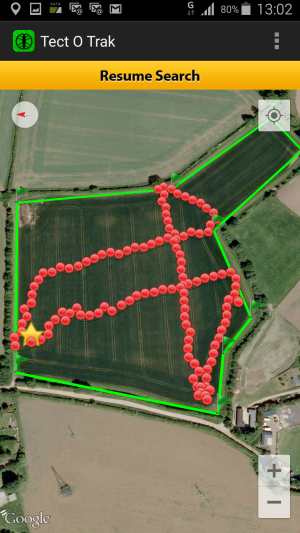A spur of the moment decision last night saw me heading this morning to the UK Detecting Rallies open rally at Carlton, near Olney, in Northants.
The site was billed as around 120 acres of ploughed, rolled and seeded arable land. ARCHI showed the area to be rich, especially in Roman material. The weather was reasonable (cloudy, around 16C and dry except for light rain mid morning). It all looked very promising, even for an open rally.
My plan was to concentrate on one field in the morning and another in the afternoon. The morning’s field had reportedly produced a William I penny the last time the site had been detected, though apparently on that occasion most diggers spent the day on another field which had produced a couple of Anglo-Saxon pennies and a few later medieval hammies.
Unfortunately it was a dead loss. By the time I left at around 1.30pm, after 3 hours detecting and an hour for lunch and talking to other diggers, the sole reported decent find was of a hammy of some sort from one field.
I didn’t bother with any of the other fields as I left straight after lunch, but it’s obviously possible that other decent finds were unearthed in the afternoon.
My impression, and that of others I spoke to, was that the fields had been more or less detected to death; if they hadn’t, why was nobody finding anything today, notwithstanding any finds on earlier visits? It was an expensive half day out, factoring in the cost of a 160 mile round trip and £15 for the dig fee. The lack of finds was obviously disappointing, but at least I met and chatted to other detectorists.
So what did I find? Nothing indeed to call a “find”, certainly, but the scrap included:
- 2 golf balls (both surface finds)
- Several pieces of lead
- Around a dozen pieces of thinnish, foil-like metal
- Half a horse shoe
- The head of a sledgehammer
- A bolt
- The bases of half a dozen very small bullets or cartridges, possibly from a rook rifle
As mentioned in an earlier post I have been trying out Tect O Trak which plots your route around a field and shows the positions of any finds against the route. When I reviewed my wanderings around the field, Tect O Trak seemed to have summed the day up pretty well:
It was, nevertheless, a joy to detect with a pin-pointer that sounds off only when it should do.

